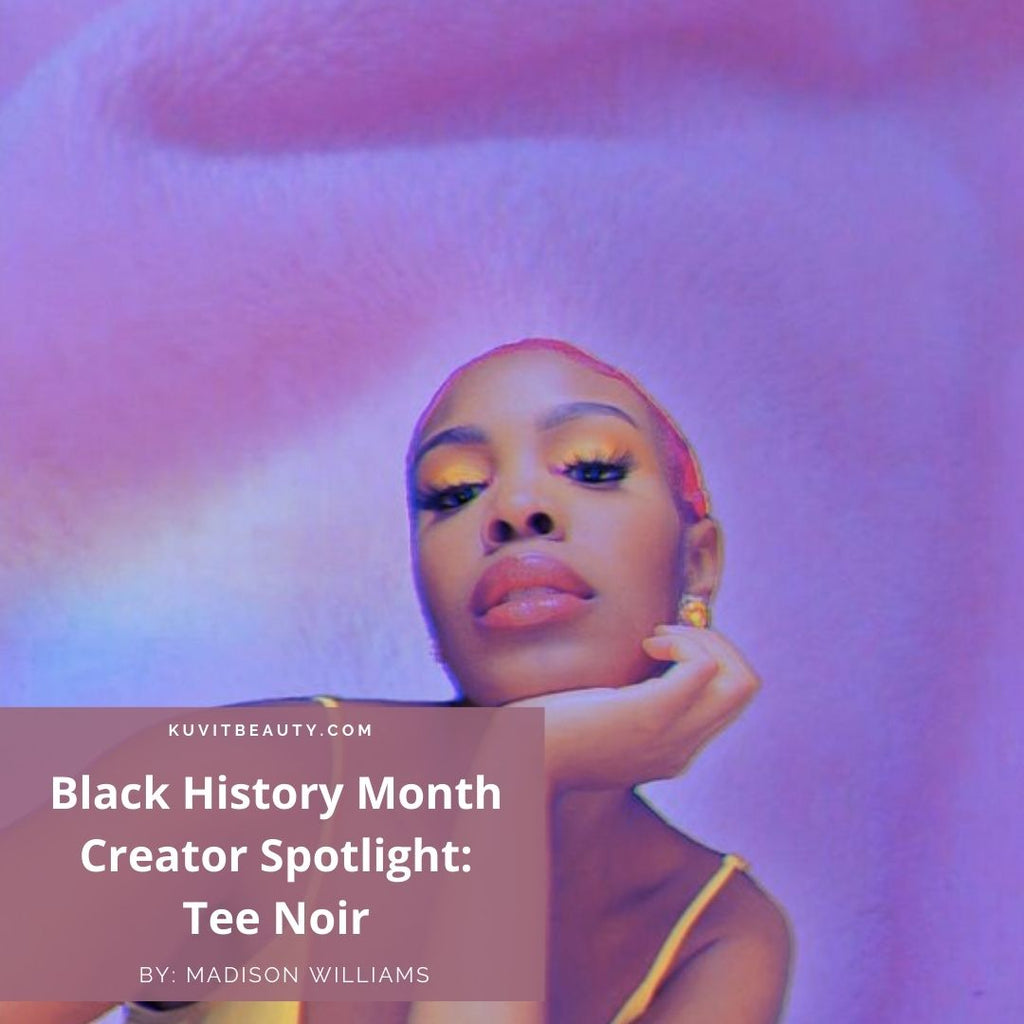Black History Month Creator Spotlight: Tee Noir

Black History Month Creator Spotlight: Tee Noir
Introduction:

(Image from her Instagram)
I am so excited to kick start our “Black History Month Creator Spotlight” with Tee Noir! Every Saturday for the month of February Taylor and I will be posting a blog dedicated to some of our favorite Black creators we have discovered this past year. Due to the pandemic this year has been heavy in media consumption for me. Living between watching the news obsessively or watching other content to distract me from the news, finding these Black content creators has been a huge silver lining. By changing the way Kuvit usually celebrates Black History Month, we hope to place action behind our beliefs through uplifting other Black Creatives, because it isn't easy. Hopefully you will find new people to support who crank out valuable content that you enjoy, let’s get started!

(Image from her Instagram)
Tee Noir specializes in Social Commentary videos, a rising sub-genre on YouTube. She reviews TV shows, discusses current events, and breaks down specific topics through a sociological lens centered around Blackness. Her videos reject the dichotomy of Right Vs. Wrong and force more complex and nuanced conversations into the forefront. Voices like Tee's are so important in the YouTube space because so often Black Women face the brunt of the negativity on the platform by way of racist creators, censorship, and lack of support. Black Women led commentary channels often use their platforms to confront, dispel and reject many of these negative stereotypes in interesting and creative ways.
Top Three Favorite Videos:
The "Blaccent": Non-black Creators' Key to Fame:
A Blaccent is, “A distinctive Manner of speaking, pitch or tone particular to African American youth” according to Urban Dictionary. This is a trend that has been extremely popular for a long time, imitating a stereotypical “Ghetto Black Girl'' is one of these most common cornerstones in comedy. Whether it's Black men doing it, like Martin Lawrence's character Shanaynay, or Asain women doing it, like rapper turned serious actor Awkwafina, the Blaccent is the fuel that rockets some of your favorite entertainers to fame. There is a growing number of Social Scientists that believe AAVE is a distinctive subsection of the English language. AAVE is short for "African American Vernacular English", which translates to slag popularized by African American people. For some reason the combination of AAVE and the Blaccent work together to make everyone but the Black people that popularized it famous. In this video Tee Noir specifically discusses the rise of the "Blaccent trend" on the app TikTok. Many of the most famous creators on the app grew their following through the use of a Blaccent and AAVE without crediting who popularized these terms in the first place. While at the same time TikTok is actively and unequally censoring Black creators on the Platform. Check out the video above for more!
Trans Visibility is NOT Where it Should Be:
"The Black Girl Fetish": Lets Talk
The Fetiziation of Black Women occurs when people of another race are attracted to Black Women as they relate to the stereotypes that are placed upon them. For example, There is a huge population of individuals that claim they are attracted exclusively to Black Women, but when asked why, they often use classic micro-aggressive reasons. They often describe their love for Black women through these classic tropes, their curvaceous bodies, their strength or their aggressive attitudes. Are all of these stereotypes bad? No. Do some Black women have these characteristics? Yes. But the important point being made is that these qualities that you love about Black Women are based in White Supremacy, they are not based on the characteristics these women have individually. By doing this they are boiling complex people into generic replaceable objects. In this video Tee Noir specifically describes another popular TikTok trend where non-black people try to get clout simply because they find Black women attractive. She makes it clear that this type of praise is not a compliment and should not be taken as such. Due to the hierarchy of desirability in America, Black Women are at the bottom of the totem pole when it comes to beauty. So these non-black TikTokers are capitalizing on that reality in order to gain a following on the app itself, making it a self serving action. Check out the video above for more!
Conclusion:

